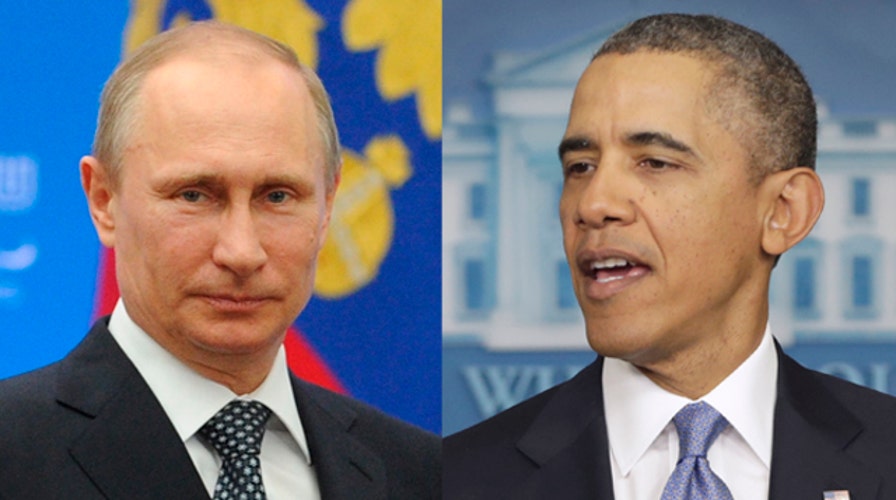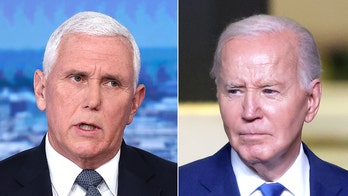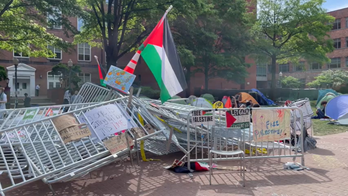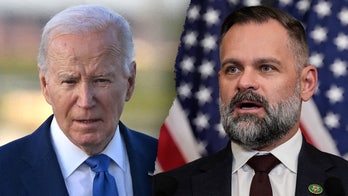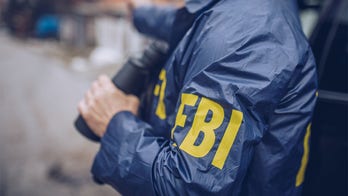Do Obama's sanctions hold any weight with Putin?
Reaction to president's course of action against Russian officials after Crimea vote
WASHINGTON – Faced with calls for a swift and stern reaction to Russia's threatened annexation of Crimea, President Obama wielded his executive pen Monday morning, slapping seven in Vladimir Putin's inner circle -- but not the Russian president himself -- with sanctions freezing their U.S. assets.
[audio-clip]
But almost immediately, some criticized Obama's response as not being enough to change Putin's course. With Crimea voting Sunday to break off from Ukraine, Russia is poised to potentially annex the disputed peninsula -- and Putin has already signed a decree recognizing Crimea as a "sovereign and independent country." Freezing U.S. assets of Putin cronies and barring them from traveling to the U.S. may have limited effect. Four Ukrainians were also sanctioned.
"The crisis in Ukraine calls for a far more significant response from the United States. Today's Executive Order could be an important part of that response, but sanctioning only seven Russian officials is wholly inadequate at this stage," Sen. John McCain, R-Ariz., said in a statement.
McCain also took to Twitter to urge military aid for Ukraine. "Incredibly Pres Obama's stmt didn't mention military assistance to #Ukraine, a sovereign nation that's been invaded by #Russia," he wrote.
While stopping short of singling out Putin himself, Obama sanctioned seven high-ranking Russian officials on Monday. The administration also announced sanctions against separatist leaders in Crimea and former president of Ukraine Viktor Yanukovych. The expanded U.S. sanctions, announced in an executive order, would target the assets of the listed Russian officials and bar them from entering the U.S. These include Putin aides Vladislav Surkov and Sergey Glazyev.
"We're making it clear that there are consequences for their actions," Obama said in the White House briefing room, while reaffirming that Crimea's vote in favor of joining Russia will not be recognized by the international community.
The president spoke just hours after Crimea's parliament declared the region an independent state, following its residents' overwhelming vote Sunday to break away from Ukraine and seek to join Russia. The president said he believes "there's still a path to resolve this situation diplomatically" but announced expanded sanctions to "increase the costs" on those responsible for the stand-off.
But some argued that the administration should crank up its response now.
"It's unlikely that these will really get President Putin's attention," said Michael Singh, with The Washington Institute for Near East Policy. "Maybe the time for this sort of first step was several weeks ago."
Singh said that some of the measures the U.S. may be holding on reserve -- like sanctions against the Russian arms industry and other oligarchs -- should be applied soon. "Now we need bolder, swifter action," he told Fox News, describing the current approach as "incrementalism."
Rep. Ed Royce, R-Calif., chairman of the House Foreign Affairs Committee, said the sanctions from the U.S. and European Union "will be heard in Moscow," but urged further measures -- including efforts to break Moscow's "energy grip" on Ukraine and beyond.
"The U.S. and our European partners must quickly ramp up pressure on Vladimir Putin and his accomplices to show that their aggression in Crimea and beyond will hurt personally," he said in a statement. "Putin has engineered this confrontation. We should show him and his accomplices that they will pay a heavy price if they don't respect Ukraine's sovereignty."
In Russia, one of the targeted officials appeared to mock the U.S. sanctions, reportedly saying on Twitter: "Comrade Obama, and what will you do with those who have neither accounts nor property abroad? Or didn't you think of that?''
The White House defended its actions.
"We have fashioned these sanctions to impose costs on named individuals who wield influence in the Russian government and those responsible for the deteriorating situation in Ukraine," the White House said in a statement. "We stand ready to use these authorities in a direct and targeted fashion as events warrant."
Meanwhile, European Union foreign ministers slapped travel bans and asset freezes Monday on 21 people from Russia and Crimea who they linked to the push for the secession of Ukraine's strategic Black Sea peninsula.
The sanctions came hours after Crimea's parliament declared the region an independent state, following its residents' overwhelming vote Sunday to break away from Ukraine and seek to join Russia.
The ministers meeting in Brussels did not immediately release the names of those targeted by the sanctions.
Two diplomats said the sanctions targeted 13 Russians and eight people from Crimea. The diplomats spoke on condition of anonymity because the breakdown of the nationalities had not been officially announced.
The 28-nation EU and the United States say Sunday's Crimean referendum was illegitimate and unconstitutional.
The EU is walking a tightrope between punishing Moscow and keeping open lines of communication with Russia for a diplomatic resolution of one of the worst geopolitical crises in years on its eastern doorstep.
Before Monday's meeting in Brussels, German Foreign Minister Frank-Walter Steinmeier said sanctions must leave "ways and possibilities open to prevent a further escalation that could lead to the division of Europe."
The EU has already suspended talks with Russia on a wide-ranging economic pact and a visa agreement. The bloc's leaders are meeting Thursday and Friday and could start slapping economic sanctions on Russia this weekend if Moscow does not back down.
Western allies are calling on Putin to "de-escalate" the crisis, support Ukrainian plans for political reform, return Russian troops in Crimea to their barracks and halt advances into Ukraine and military buildups along its borders.
Ukraine's new government in Kiev called Sunday's referendum a "circus" directed at gunpoint by Moscow. Putin, however, insisted it was conducted in "full accordance with international law and the U.N. charter" and cited Kosovo's independence from Serbia as its precedent.
The Associated Press contributed to this report.
